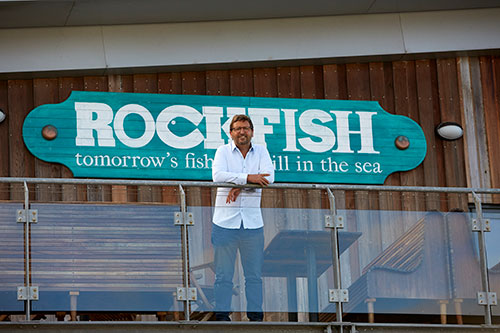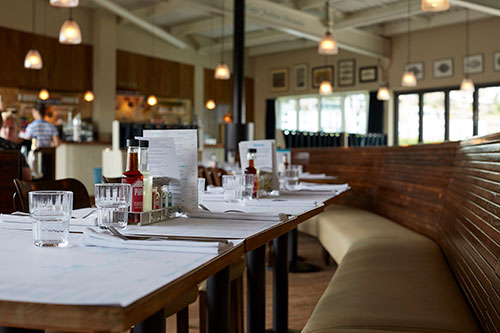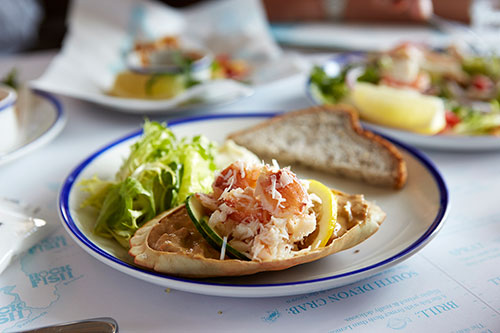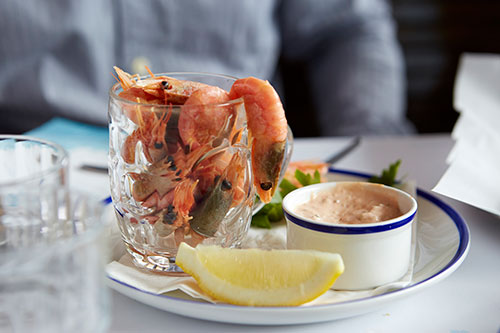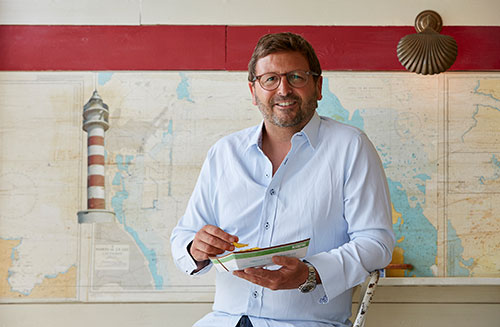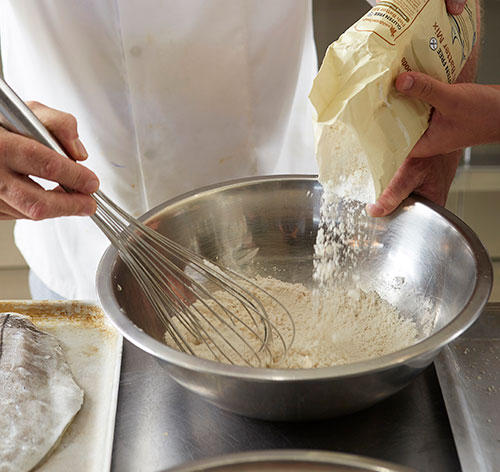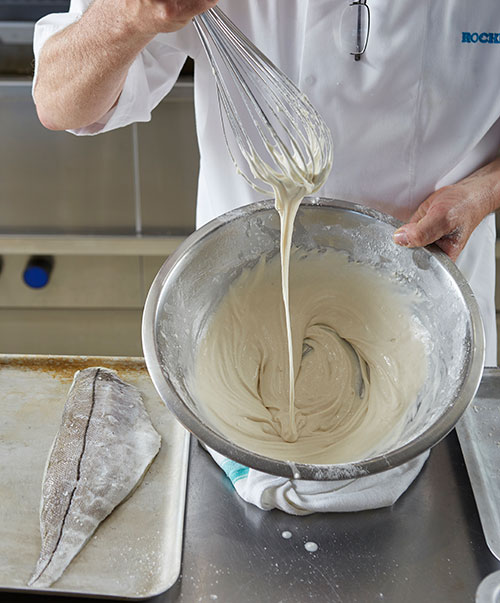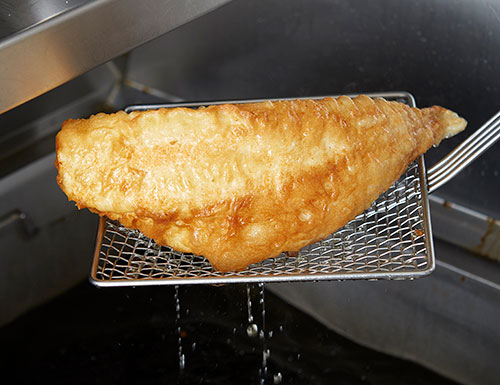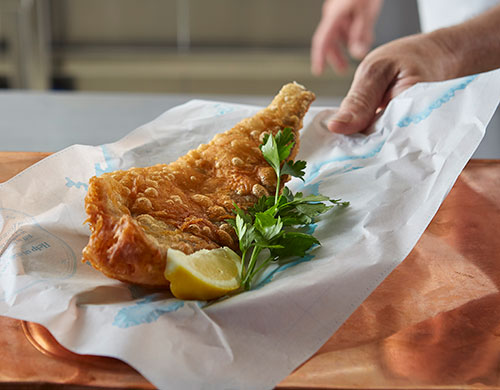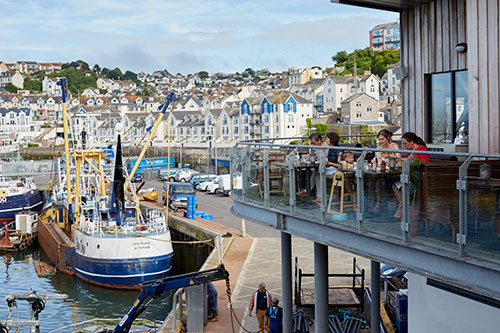Going gluten-free: how Mitch Tonks changed his menus
Chef-restaurateur Mitch Tonks has committed to ensuring his Rockfish restaurants' menus have an entirely gluten-free option. But it's involved much more than just a change of flour, discovers Michael Raffael
It started, Mitch Tonks recalls, with a phone call: "A customer told me I'd made his coeliac wife ill. My response was that my kitchens used gluten-free flours for batter and that we followed all the procedures. He explained that for people with the disease, it was vital that oil shouldn't come into contact with gluten, whereas Mat and I, as chefs, thought, ‘We're frying at high temperatures, so how could that be a problem?'"
This chance conversation started Tonks and his partner Mat Prowse (who cooks with him at the multi-award winning Seahorse in Dartmouth) off on a journey to redesign their work stations, kitchens and practices in Rockfish, his group of fish restaurants in the West Country. For a small but successful chain, it's been a momentous step.
Tonks launched a gluten-free menu alongside his usual menu at his Dartmouth and Brixham Rockfish restaurants in June, and will have added Plymouth and Torquay by the end of July, when he expects to receive accreditation from Coeliac UK.
Thanks to the help from his guest, Tonks learned the key fact that when catering for coeliacs, the frying oil should never have had contact with wheat flour. In a conventional fish-frying operation, there are kettles or pans for frying batter, breaded items and chips. The filtered oil is pumped through all three, and some cross-contamination is bound to occur.
So dipping a fillet of cod in a separate batter wasn't a gluten-free solution: "All our competitors were doing this, so we knew we'd have to go a step further. This would mean installing autonomous traditional and coeliac ranges, each with their own filtration system. We helped our supplier of the ranges completely redesign the filtration to suit this."
"When we decided to do the switch," he says, "rather than make a token gesture aimed at those with the allergy or making a dietary choice, we chose the 100% solution. We didn't want to have a second menu which would make those with dietary or health concerns uncomfortable."
He and Mat Prowse, with group head chef Kirk Gosden, oversaw the details: what kind of bread to source, which sauces and tracklements needed changing, basics like finding a crumb equivalent to the panko ones they'd been using, and even sourcing gluten-free beer in the form of Estrella Galicia from Spain. The process took nine months.
Rockfish menus are in two parts. The paper slips on tables list wet fish for grilling and the waiters underline those the restaurant has available that day. The printed menu displays items that are always available. By keeping to a simple format like this, Tonks feels he has created a better experience for customers: "We've cleaned up the look. There are no messy signs or symbols. When people go out to eat, they want to relax; they don't want to decipher some kind of code."
Main course prices range from £11.95 for cod and £12.95 for line-caught haddock to £14.95 for a fritto misto of prawns, monkfish, scampi, fishcake, calamari and cod in batter. They come with unlimited chips or salad and a classic tartare sauce.
Implementing the decision has had no bearing on day-to-day costs - neither positive nor negative. But it has increased Tonks's potential market: "We've given back fish and chips to a potential clientele that was unable to eat them."
Covers served at his Brixham base fluctuate between 400-500 per day during the summer and dip to around 150 in winter. The average spend fluctuates between £12 and £24, with a gross profit of 69%. According to Tonks, Rockfish has a broad base. "I describe it as democratic seafood because everyone can enjoy it," he says. "We don't want to put off food lovers. They can come in, order a dozen oysters with a great Chablis and have lobster or grilled monkfish. At the same table a family can have fried whiting and a burger."
Rockfish, he insisted, is quite unlike Fishworks, the "upmarket" chain he created and ran until it foundered in 2009, with Tonks selling three of the restaurants. "First of all, Rockfish is privately owned. We're a group of private shareholders who aren't driven by need. We want to build a fantastic business. All our decisions about growing it are shaped by that aim rather than short-term financial gain. Fishworks was expensive. We sold a lot of prime fish, but we were alienating people."
Tonks's management style reflects the fact he runs restaurants that depend on good systems. It was, he said, built around the staff he employs: "[Rockfish's] nucleus is a team of half a dozen who get the vision that Mat and I want to deliver and we build the culture around them. We cost-in a 5% pay rise for everyone who stays with us for a year, for up to three years. By 2017/18 nobody will work more than a 45-hour week. We want people to work hard and have enough time to enjoy the sea!
"We've a detailed training programme teaching those we employ how to behave towards customers in a way that we would. We want their jobs to be enjoyable. "
The choice of locations means that the four units - Brixham, Torquay, Plymouth and Dartmouth - are all close to the sea and within striking distance of each other.
When he started out with the Green Street Seafood Cafe in Bath - a fishmonger with a few tables above the shop - Tonks won accolades from Good Food Guide by buying fresh wet fish. At Rockfish, however, his approach to sourcing has shifted in order to maintain a consistent supply. Now he buys fresh and frozen, and purchases frozen wild Norwegian prawns, and farmed prawns too, from Marine Stewardship Council sources and Best Aquaculture Practices-accredited farms. All the cod and haddock is Norwegian and flash frozen, from sustainable stocks, and are his best sellers.
Prize catch
- Restaurateur of the Year - Mitch Tonks
- Observer Food Monthly UK Restaurant of the Year - Seahorse
- Seafish National Fish & Chip Awards: Best Newcomer - Rockfish - and Best Independent Restaurant, Multiple Operator and Best Community Contribution
A Tonks timeline
- 1996 First fishmonger opens in Bath
- 1998 The Green Street Seafood Cafe opens above the fishmonger
- 2001 Bristol and Christchurch Fishworks open
- 2003 First London restaurant in Chiswick
- 2004 Marylebone High Street opens
- 2005-2007 Seven more London locations open
- 2007 Tonks leaves Fishworks to open the now highly acclaimed Seahorse in Dartmouth
- 2009 First Rockfish established in Dartmouth
- 2010 First Rockfish takeaway in Dartmouth
- 2012 Rockfish opens in Plymouth
- 2014 Rockfish opens in Brixham
- 2015 Rockfish opens in Torquay
Gluten-free fish frying
Rockfish Brixham's head chef Kirk Gosden buys 1kg bags of Middleton Foods gluten-free batter mix, which is based on Doves Farm gluten-free flour. Even when the restaurant is busy, Gosden never leaves it standing, and instead makes small batches every hour.
To prepare the batter, whisk the cold water in a little at a time. The quantity of water isn't precise, as the batter should be neither claggy nor thin; it should fall off the whisk.
For cod and haddock he uses 275g-300g fillets. Don't ever flour the fish. Dip it into the batter by hand, holding it by the tail. Allow any drips to fall back into the bowl of batter before dropping the fish into the oil.
The oil temperature is 180°C. The fresher the oil is, the better the batter's appearance. Many traditional fryers want the fish to have a mid-gold shine. Gosden prefers a paler tinge - slightly darker than tempura.
The fish should be crisp after four minutes. If it's been done properly, it won't need draining. Ideally, it should rest for a short time before service.
If the kitchen prepares gluten-free recipes, ensure there are separate, gluten-free only versions of the following:
- Mixing bowls
- Frying equipment
- Oil
- Frying baskets
- Ladles and spiders
- Trays
- Serving dishes and containers
About Coeliac UK
Coeliac UK is a registered charity that campaigns to help coeliacs identify gluten-free products. Accreditation benefits include:
- Licence to use the GF symbol on menus, marketing materials, website and promotions
- An accreditation certificate for display, plus window stickers
- Free access to the online catering training course
- Free copy of the Quick Tips Kitchen Flipbook for easy reference
- Free premium listing on the Coeliac UK Venue Guide and new smartphone app, Gluten-free on the Move, per venue
- Announcement of your accreditation to over 60,000 Coeliac UK Members via Crossed Grain magazine or its electronic newsletter
- A biannual newsletter for Coeliac UK-accredited caterers, including updates on best practice, menu ideas and ingredient updates
- Social media announcement of accreditation via Facebook and Twitter
For more information on accreditation, visitwww.coeliac.org.uk/food-industry-professionals



